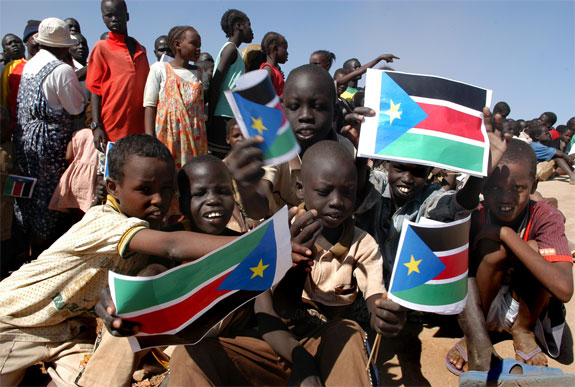Basque Country: ETA declares permanent ceasefire, Basque left set for gains

By Andy Bowden
October 21, 2011 -- Scottish Socialist Youth -- Amid the worldwide media coverage of Gaddafi’s death, a historic development in another conflict went largely unnoticed -- after more than 40 years of a military campaign against the Spanish state, the Basque armed group ETA announced a permanent end to its use of violence in the struggle for an independent and socialist Basque state. This follows previous announcements from the group, declaring a desire to pursue Basque independence through peaceful measures.
Gaddafi, imperialism and Western hypocrisy

"The lesson of Saddam Hussein, Hosni Mubarak, Ben A
Two radio interviews with Ian Angus: What is ecosocialism? Are there too many people?

October 24, 2011 -- Is the ecosocialist revolution coming? Ian Angus is a veteran of the socialist and environmental movements in Canada. He is also the founder of climateandcapitalism.com, and co-author of the new book, Too Many People? Population, Immigration and the Environmental Crisis. He visited Adelaide, South Australia, in September, to speak at a public forum organised the Socialist Alliance, on “Political solutions to the climate crisis: What is ecosocialism?” He was in Australia to participate in the Climate Change, Social Change conference in Melbourne, September 30-October 3.
Socialist Alliance condemns violent police attacks on Occupy Melbourne and Occupy Sydney
For more reports on the Occupy movement, click HERE.
By Socialist Alliance (Australia)
October 23, 2011 -- Socialist Alliance -- Socialist Alliance condemns the violent police dispersal of peaceful protesters at Occupy Melbourne (October 21) and Occupy Sydney (dawn, October 23) and pledges its full support for the re-establishment of these occupations against the tyranny of the world's richest 1%.
The experience around the world has been whenever one of these Occupy movement camps has been attacked, even more people have rallied to support them in response. We are confident the same will happen here.
John Bellamy Foster: Capitalism and the accumulation of catastrophe
Film produced by Jill Hickson and John Reynolds.
[For more material from the conference, click HERE.]
October 20, 2011 -- Links International Journal of Socialist Renewal -- At the 2011 Climate Change Social Change Conference held in Melbourne, John Bellamy Foster, Marxist academic, editor and author on economics and ecology, was a featured speaker. Above is the video of his keynote speech on September 30.
The conference was sponsored by the Office of Environmental Programs, Melbourne University, and organised and co-sponsored by Green Left Weekly, Resistance, Socialist Alliance and Links International Journal of Socialist Renewal. Other co-sponsors included Friends of the Earth (Melbourne), the Labor Party Pakistan and Sydney University Political Economy Society.
Occupy! More reports from the frontline: Wellington, Dublin, Canada, US cities
Nati at Occupy Wellington.
[Are you a participant in an Occupy action in your city or town? Please leave a report in the comments section below. For more activist reports on the Occupy movement, click HERE.]
Occupy Wellington
By Grant Brookes
October 20, 2011 -- UNITYblog
“Why are they protesting?” ask the baffled pundits on TV. Meanwhile, the rest of the world asks: “What took you so long?” -- Naomi Klein
With comments like this, campaigning journalist Naomi Klein has captured the essence of the mushrooming movement against corporate greed which began on Wall Street. The movement is expressing the feelings of a global majority denied a voice in the media and in the corridors of power.
It spread to Aotearoa on October 15, when occupations began in Auckland, Wellington, Christchuch, Dunedin, New Plymouth and elsewhere.
#Occupy Melbourne diary: Six days of peaceful protest, then police violently attack
Green Left Weekly’s Sue Bolton has been part of the Occupy Melbourne protest since it began on October 15, 2011. Below she recounts the past week of the occupation in Melbourne’s City Square, which was broken up by a violent police assault on October 21. However, protesters have vowed to re-establish the occupation once more. For more updates on Occupy Melbourne, regularly check GLW's live blog at http://www.greenleft.org.au/node/49153.
For more activist reports on the Occupy movement, click HERE.
* * *
Day 5, October 19, 2011: Still going strong
We are still going strong with about 45 to 50 tents in City Square. I estimate there are about 100 people camping each night with many others staying until late in the night.
The occupation has been set up as a well-established occupation with a 24-hour roster for the info desk and the kitchen. The kitchen is feeding homeless people who also use the square.
(Updated Oct. 23) Occupy wave reaches Pakistan

Occupy Karachi march, October 22, 2011. Photo by Comrade Sherbaz.
Occupy Lahore!
By Farooq Tariq
Afghanistan: Predictions, obstructed justice and 10 years of war
By Rupen Savoulian
Sudan/South Sudan: Communist Party sees dangers, but also possibilities for progress

South Sudan's independence celebrations.
The tide of rebellion and revolution now sweeping Latin America is posing a serious challenge to imperialism’s brutal global rule. For anyone who wants an end to war, exploitation and oppression, Latin America’s struggles to create alternatives are crucially important.
Australia's leading socialist newspaper Green Left Weekly is strongly committed to supporting the growing “people’s power” movement in Latin America. Through our weekly articles on developments in the region, GLW strives to counter the corporate media’s many lies about Latin America’s revolutions, and to give a voice in English to the people’s movements for change.
The continent-wide rebellion is weakening imperialism’s power. As a result, it is taking increasingly threatening steps to push back the power of the people. Our solidarity, to help the people of Latin America defend and extend their tremendous achievements, is vital.